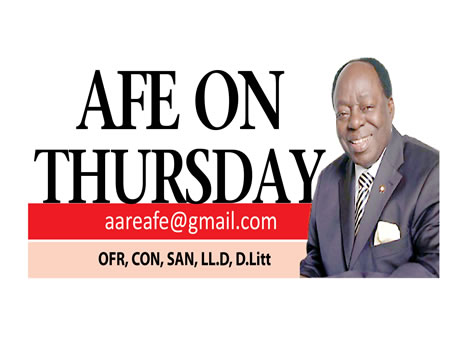AS 2019 was winding down, Nigerians in different places, including schools, universities, offices, churches, mosques, market places most deservedly discussed what Nigeria would be like in 2020 having regard to the multifarious problems that afflicted Nigeria in 2019.
Glossary of some of Nigeria’s problems
Such ills included, but were not limited, to unpaid salaries, pensions and other emoluments, spiral unemployment, different shades and shapes of violence, armed robbery, poverty, grossly underfunded institutions, poor infrastructure including deplorable road network, insecurity at home, on the road and on the farms as well as killings for different motives.
In 2019, Nigeria witnessed many cases of kidnapping of Nigerians and non-Nigerians alike. High Court Judges and Justices of Court of Appeal were not spared. The problem of insecurity came to a head around Christmas last year when the home of country’s immediate past President, Dr. Goodluck Ebele Jonathan, was brazenly attacked in Otuoke, Bayelsa State, despite the intricate web of security woven around him.
The common currency in the discussion by people from different strata of the societal ladder was where do we go from here? What should we expect in 2020? While most were pessimistic about the resolution of the problems identified above, there were some others who were conversely optimistic. They expect that some miracles could happen and that 2020 would indeed be a better year than the preceding year.
Two miracles in 2019
As if the prayer of the few optimistic ones was heard, two miracles happened towards the end of 2019:
- The first was the closure of Nigerian borders with Niger Republic and Benin Republic which has brought a modicum of hope to the economy. For example, many Nigerian farmers have now gone back to their farms with the firm belief that they now have a ready market for their farm products unlike the practice before the border closure when their farm products were pushed to the back burner because of illegal importation of items like rice, fish, maize and others from neigbhouring countries.
- The second was the sudden change of mind by the Federal Government, when like a bolt from the blues, news filtered in on Christmas Day that President Muhammadu Buhari had released Col. Sambo Dasuki, President Jonathan’s National Security Adviser, NSA, who had been incarcerated since December 2015 and Mr. Omoyele Sowore, the Founder of Sahara Reporter and the Proponent of #Revolution Now, who has been in the gulag for four months before his eventual release.
Commendation for President Buhari
I join millions of Nigerians in commending President Buhari for obeying Court Orders thereby firing the hope that this government believes in the Rule of Law. It is important to emphasize that the Rule of Law is the solid pillar on which democracy properly so called stands.
Identification of Nigeria’s problems
But no matter how well-placed the intention of the President and other Nigerian political leaders to tackle the problems highlighted above may be, such intention might come to naught unless Nigeria identifies the root causes of the problems and proffer workable solutions to them properly and quickly too. There is this time-tested Yoruba aphorism, to wit: “Ebi kii wonu, ki oro miran wo” which translates roughly to “when a man is poor, he becomes hungry, when he is hungry, he becomes angry and when he is angry, he can engage in any vice like kidnapping, larceny, outright robbery and all forms of violence that were alien to our land in the days of yores”.
Those of us who are over 80 years old will recall that there was no poverty as it is known today, in Nigeria in those days. This was simply because everybody was gainfully employed. Even those who were engaged in other vocations like Bricklaying, Barbing, Trading and Carpentry still engaged in Agriculture if only to feed members of their immediate families. That was the trend in those days. It is my humble view that it is only when our problems are identified that we can proffer solutions to them.
Knowing that Nigeria contains more than 250 ethnic nationalities with different cultures, languages, religions and customs, Nigeria’s founding fathers, after sitting together in Lancaster House in London for almost 10 years, fashioned out a constitution that united the different ethnic nationalities. This was one of the main reasons why both the 1960 Independent Constitution and 1963 Republican Constitution worked well before the Military made a forceful incursion in governance following the Military coup of January 15, 1966.
In essence, when the 1960 and 1963 Constitutions were in operation in Nigeria, poverty and other problems afflicting Nigeria today were virtually non-existent in the country.
The real problem
The real and main problem Nigeria has today is the Military Constitution which was christened 1999 Constitution and foisted on us by the Military. Unless the 1999 Constitution is properly addressed and jettisoned in a place of a truly people’s constitution, we shall continue to groan in pain as a nation. The 1999 constitution should be jettisoned because it encouraged indolence, lack of creativity, greed and avarice, wanton struggle for positions in the Central Government and the untoward attitude of begging for monthly allocation from the Federal Government. It is common knowledge today that politics has suddenly and lamentably become the only lucrative business in the country.
Jostling for the 2023 elections
Already those who are benefiting from the mess created by the warped 1999 Constitution, making billions of Naira at the expense of the massive majority of Nigerians, are already angling for the 2023 Elections instead of addressing the problems inherent in and caused by the 1999 constitution.
To be continued
You may send your comment to president@abuad.edu.ng
Aare Afe Babalola, OFR, CON, SAN





